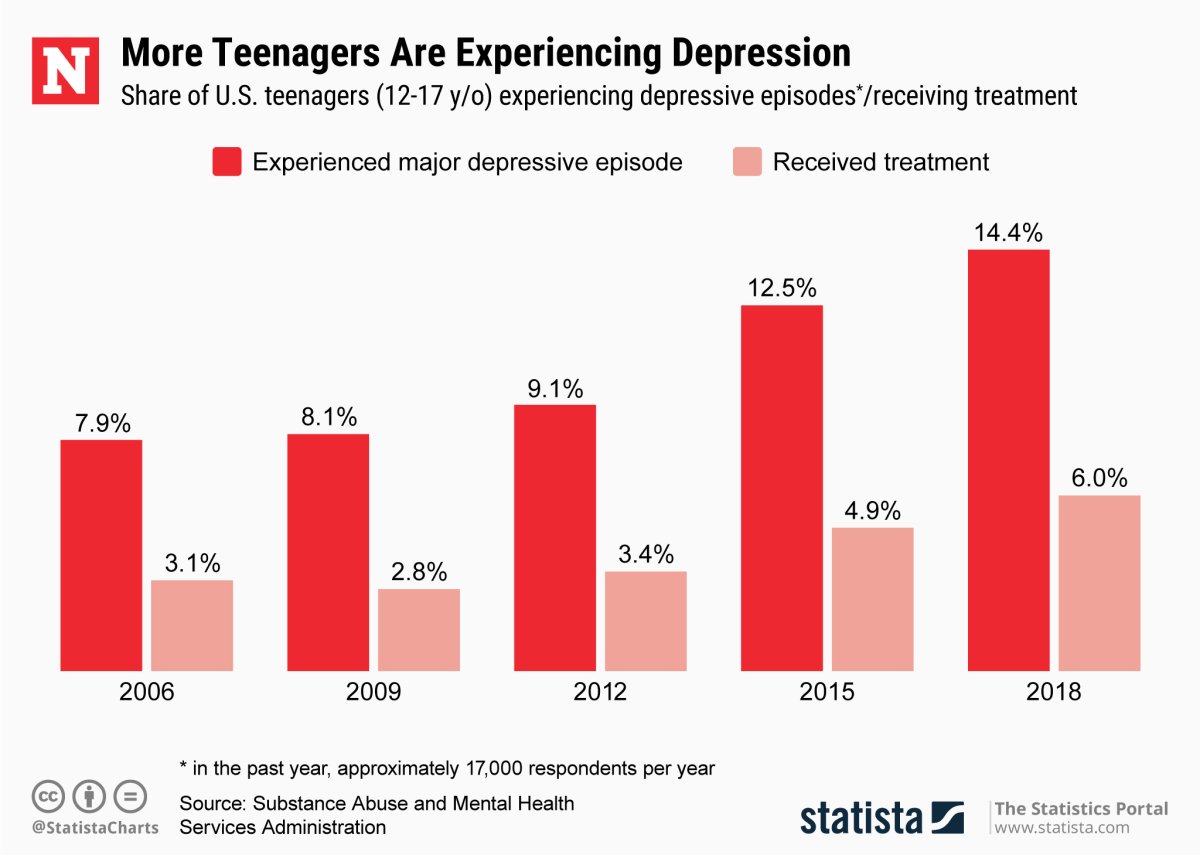Two thirds of parents in the U.S. say they feel there are barriers to them recognizing their child has depression, according to a survey.
Of the nationally representative sample of 819 parents, who lived with a child aged between 0-18 years old, 40 percent said they might find it hard to tell normal changes in moods from symptoms of the mental illness. 30 percent said children were good hiding their feelings.
A further 14 percent of parents who took part in The C.S. Mott Children's Hospital National Poll on Children's Health at the University of Michigan said young people don't talk much about their feelings; 7 percent said they don't spend enough time with their children; and 4 percent were unclear what the signs of the condition were.
Some parents, however, were more certain they could identify depression in their child. A third said nothing would make it hard for them to recognize depression in their child. Some 42 percent said they were very confident, and 48 percent somewhat confident, that they would pick up the signs and symptoms.
When asked about their child's understanding of depression, 22 percent of respondents said they were very confident, and half somewhat confident, that they would notice the signs of depression in themselves. But 28 percent said they were not confident, and 12 percent said their child would be unlikely to turn to them if they felt depressed.
Researchers also looked at the part played by schools in protecting their child's mental health. Of the total, seven in 10 said schools should screen students for the condition. Some 29 percent said institutions should definitely test all students for depression, 42 percent said probably yes, 22 percent probably not, while 7 percent said no. Just under a quarter said screening should start in 7th or 8th grade, while 47 percent said 6th.
The study also revealed one in 10 parents said their child knows a peer who has taken their life, and a quarter said their child knows someone with depression.
The research comes against a backdrop of rising rates of suicide in the U.S. among young people over the past decade, which the authors of the report said highlights the importance of spotting depression.
This graphic, provided by Statista, shows the percentage of 12-17 year olds in the U.S. experiencing depression.

According to the U.S. Centers for Disease Control and Prevention, it is normal for children to occasionally feel sad or hopeless. But if they are sad or uninterested in things they used to enjoy and or feel hopeless for long periods of time, they may have depression.
Symptoms include feeling sad, hopeless, and irritable a lot of the time; not wanting to do or enjoy doing fun things; eating a lot more or less than usual; and sleeping a lot more or less than normal. A person might also experience changes in their energy levels, such as being tired or tense and restless; and also struggle to concentrate; feel worthless, useless or guilty; and demonstrate destructive behaviour or self-harming.
"Extreme depression can lead a child to think about suicide or plan for suicide. For youth ages 10 to 24 years, suicide is among the leading causes of death," the CDC warns.

Sarah Clark, co-director of the C.S. Mott Children's Hospital National Poll on Children's Health at the University of Michigan, told Newsweek: "Some have argued that parents don't want schools involved in their children's mental health issues—but findings from this report disprove that notion. Not only do parents support school-based depression screening, but most want it to begin early—at middle school, rather than waiting until high school."
"Parents may find comfort in knowing that other parents find this topic to be challenging. Awareness of the signs of depression is certainly helpful, but does not guarantee a parent's ability to recognize when their child may be struggling with possible depression. This is because youth can hide behind 'typical teen behavior,' making it hard for parents to differentiate the behaviors that are signs of depression," said Clark.
There are a number of things parents can do to protect their child's mental health, said Clark, including maintaining open communication and allowing them to talk about their emotions or worries; and speaking positively about mental health services, which will help their child view counseling or therapy as a helpful option.
"Third is to encourage their child to find at least one trusted adult—a teacher, family friend, clergy member—who can be a sounding board when the child is feeling overly down or worried," Clark advised. "This signals to the child that reaching out for help is a natural, expected thing to do."
Stephanie Samar, a clinical psychologist at the Child Mind Institute Mood Disorders Center who did not work on the project, told Newsweek: "I am most surprised at how confident parents seemed to be about their child's mental health and how many reported thinking that their children will talk to them about depression. Depression very often persists without diagnosis or treatment.
"Parents wait on average two years after the onset of symptoms to reach out for mental health treatment, so parents and children are most likely missing early signs of depression. Additionally, many symptoms of depression look like common pre-teen and teenage behaviors.
"For example, low energy and sleep problems are both a sign of depression as well as typical teenage behavior, especially as school demands increase," she said.
Samar added: "People are often looking for extreme sadness when they are looking for signs of depression. In reality, irritability is a very common sign of depression in children and teens. Children can look defiant and angry when really they are struggling with depression. In addition, suicidality and self-harm are not typical teen behavior and should never be brushed aside as a phase."
If you have thoughts of suicide, confidential help is available for free at the National Suicide Prevention Lifeline. Call 1-800-273-8255. The line is available 24 hours, every day.
This article was updated to include an infographic.
Uncommon Knowledge
Newsweek is committed to challenging conventional wisdom and finding connections in the search for common ground.
Newsweek is committed to challenging conventional wisdom and finding connections in the search for common ground.
About the writer
Kashmira Gander is Deputy Science Editor at Newsweek. Her interests include health, gender, LGBTQIA+ issues, human rights, subcultures, music, and lifestyle. Her ... Read more
To read how Newsweek uses AI as a newsroom tool, Click here.








